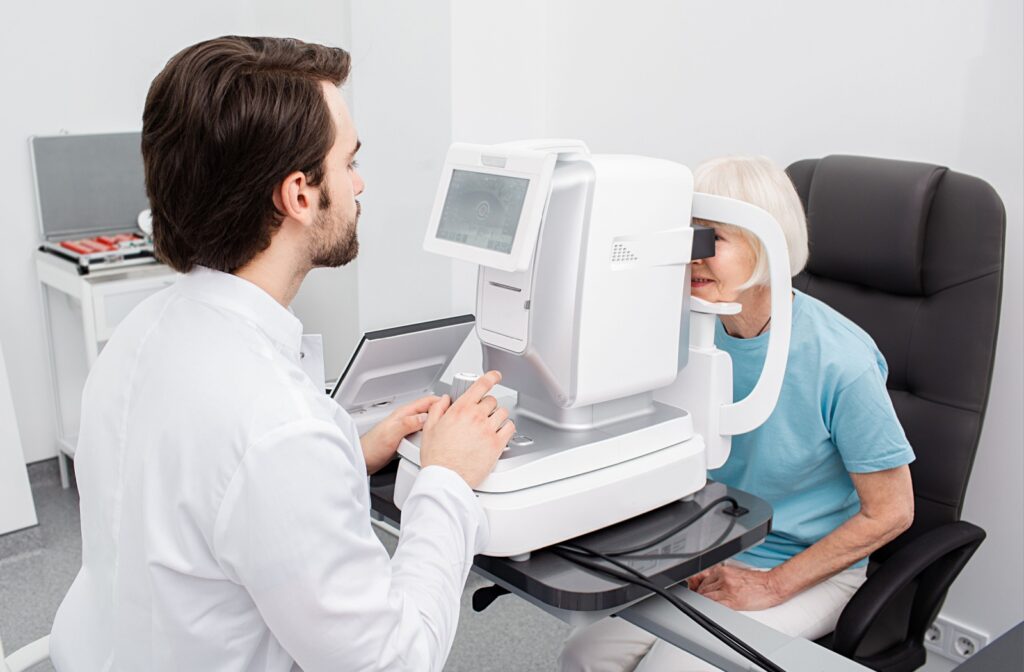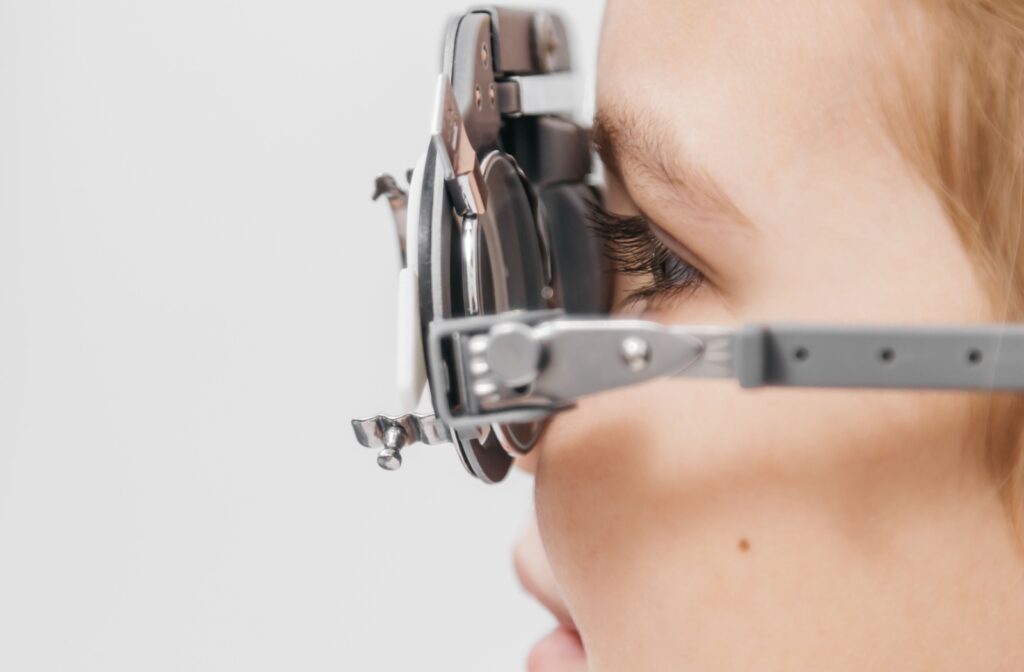Most people should get an eye exam every 1 – 2 years, but your specific needs may vary based on age, health, and vision concerns.
Eye exams are crucial for maintaining clear sight and overall health, as they can detect various eye conditions and other health problems early. Regular check-ups ensure that your prescription is current and your eyes function properly. Protecting your vision starts with knowing how often to schedule these important appointments.
How Often Should You See Your Eye Doctor?
The frequency of eye exams depends on some factors:
- Children & teens: Kids should have their first comprehensive exam by age 1, another at age 3, and again before starting school. Afterward, annual check-ups ensure proper development.
- Adults (18–60): Exams every two years are sufficient for most adults unless vision issues or risks arise.
- Adults 60+: Seniors should see their eye doctor yearly to monitor for age-related conditions like macular degeneration or cataracts.
If you wear glasses or contact lenses, have a family history of eye disease, or live with diabetes, annual exams are often recommended.
What Happens During a Routine Eye Exam?
A routine eye exam is a thorough check-up to assess vision and eye health. Here’s what to expect:
- Medical history: Your doctor will review your health and family history, as these can impact your eyes.
- Visual acuity test: A simple eye chart determines how well you can see at various distances.
- Refraction test: Your prescription is evaluated or updated using a phoropter.
- Eye health evaluation: The doctor examines your eyes using special lights and magnification to check for issues like cataracts, glaucoma, or retinal problems.
- Pupil dilation: Drops may widen your pupils, giving a better view of your retina and optic nerve.
These steps ensure a comprehensive understanding of your eye health and vision needs.
What Can Eye Exams Detect?
Eye exams go beyond just checking your eyesight; they can uncover underlying conditions affecting your vision and general health.
Visual Acuity
Visual acuity tests determine how sharp your vision is. They can identify nearsightedness, farsightedness, and astigmatism. With accurate results, your doctor can prescribe corrective lenses to ensure clear, comfortable sight for daily activities.
Blurred vision can sometimes indicate more serious issues, like corneal irregularities or underlying diseases, making these tests a critical part of your exam.
Vision-Related Conditions
Regular eye exams can diagnose common vision conditions early:
- Cataracts: Clouding of the eye’s lens that affects vision clarity.
- Glaucoma: A group of diseases damaging the optic nerve, often without noticeable symptoms until advanced stages.
- Macular degeneration: Age-related deterioration of the retina’s central part, leading to central vision loss.
- Diabetic retinopathy: A complication of diabetes that damages the blood vessels in the retina.
Early detection is vital for managing these conditions effectively.
Other Diseases & Conditions
Eye exams can also reveal signs of general health issues:
- Diabetes: Subtle changes in blood vessels can be early indicators of diabetes.
- High blood pressure: Hypertension can cause damage to the small blood vessels in your eyes.
- Autoimmune diseases: Conditions like lupus or rheumatoid arthritis often appear in the eyes first.
- Thyroid problems: Bulging eyes or vision changes can point to thyroid dysfunction.
- Tumors: Optic nerve swelling or visual field loss may indicate a brain tumor.
- Vitamin deficiencies: Symptoms like night blindness can suggest a lack of specific nutrients.
By detecting these issues early, your eye doctor can recommend appropriate treatment or refer you to a specialist.

The Risks of Skipping Eye Exams
Skipping regular eye exams might seem harmless, especially if you don’t notice any vision problems. However, this choice could seriously affect your eye health and overall well-being. Many eye conditions develop slowly and without symptoms, meaning they can go undetected until they progress significantly.
- Undiagnosed vision changes: Over time, subtle changes in your vision can lead to eye strain, headaches, or difficulty with everyday tasks. Without updated prescriptions, these issues can worsen and improve your quality of life.
- Missed early detection of eye diseases: Conditions like glaucoma, cataracts, and macular degeneration often develop silently. By the time symptoms become noticeable, irreversible damage may have occurred.
- Overlooked systemic health issues: Eye exams can detect early signs of diabetes, high blood pressure, and other systemic health concerns. These conditions may go untreated without regular check-ups, leading to more severe complications.
- Increased risk of injury: Poor or undiagnosed vision can lead to accidents, particularly when driving or navigating unfamiliar environments.
Regular eye exams are a safety net, catching problems early and helping you maintain optimal vision and health. Don’t wait for symptoms—protect your eyes with consistent care.
Book Your Next Eye Exam with Pinnacle EyeCare
Your eyes deserve the best care possible. At Pinnacle EyeCare, we provide personalized, thorough exams to protect your vision and overall health. Schedule your appointment today and take a proactive step toward preserving your sight!






